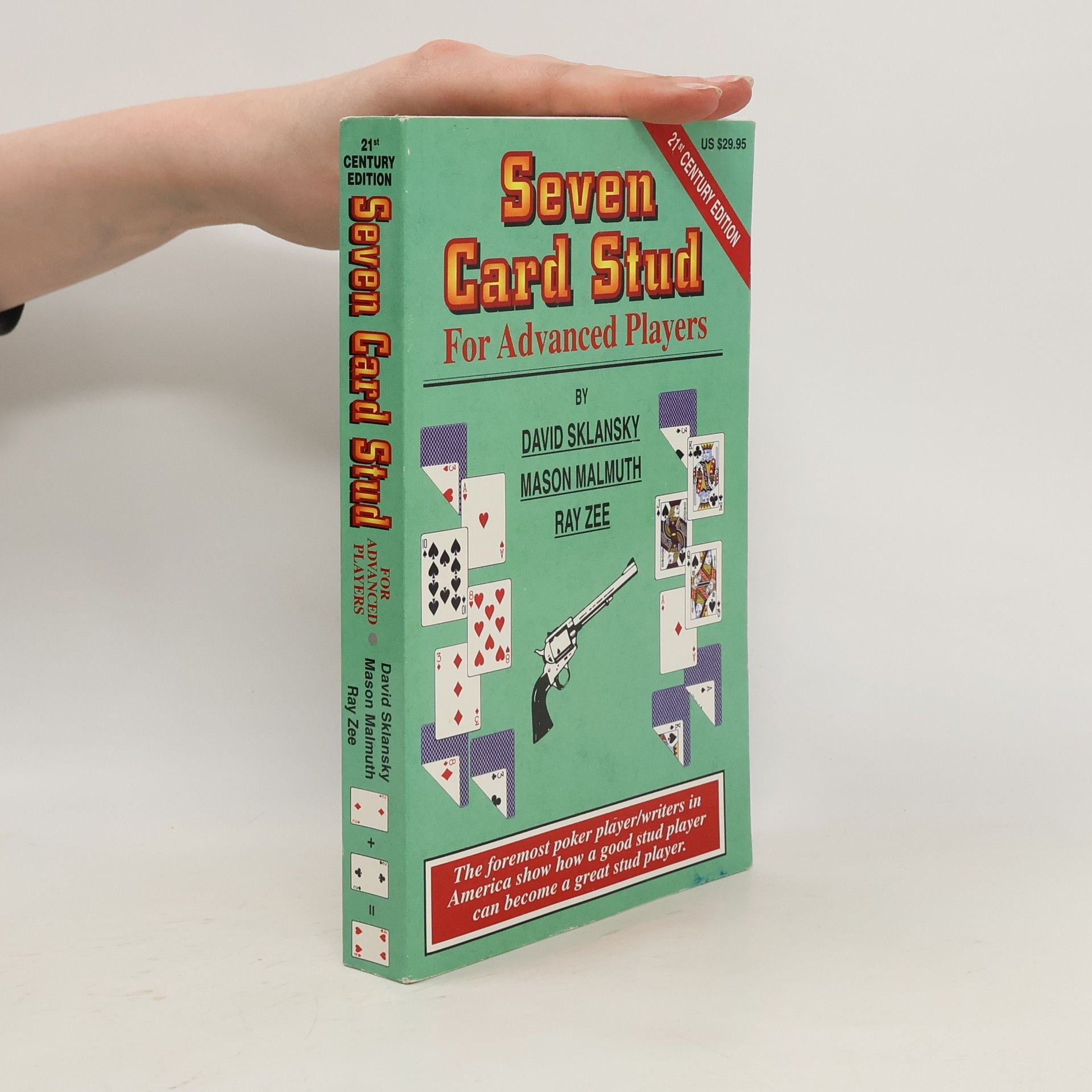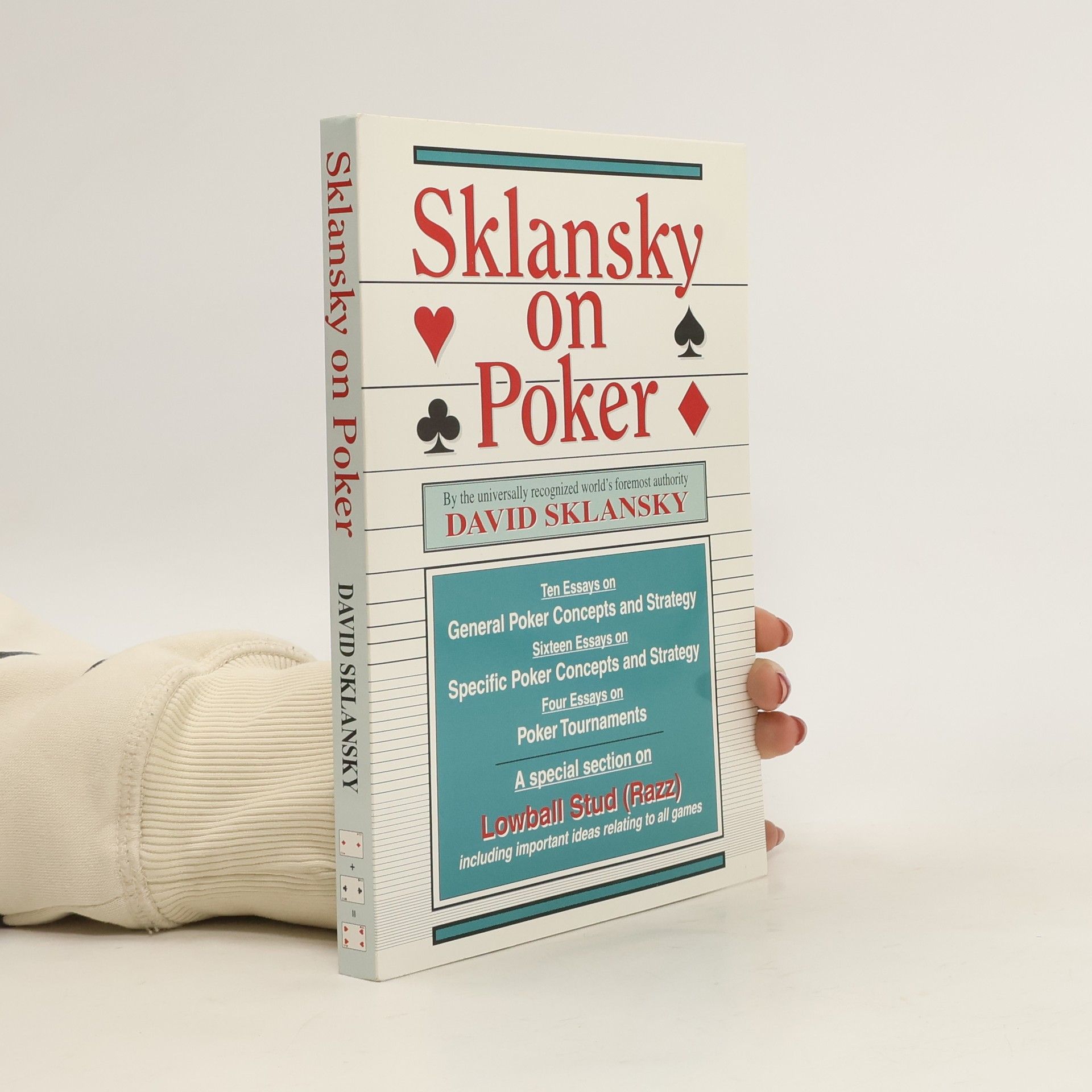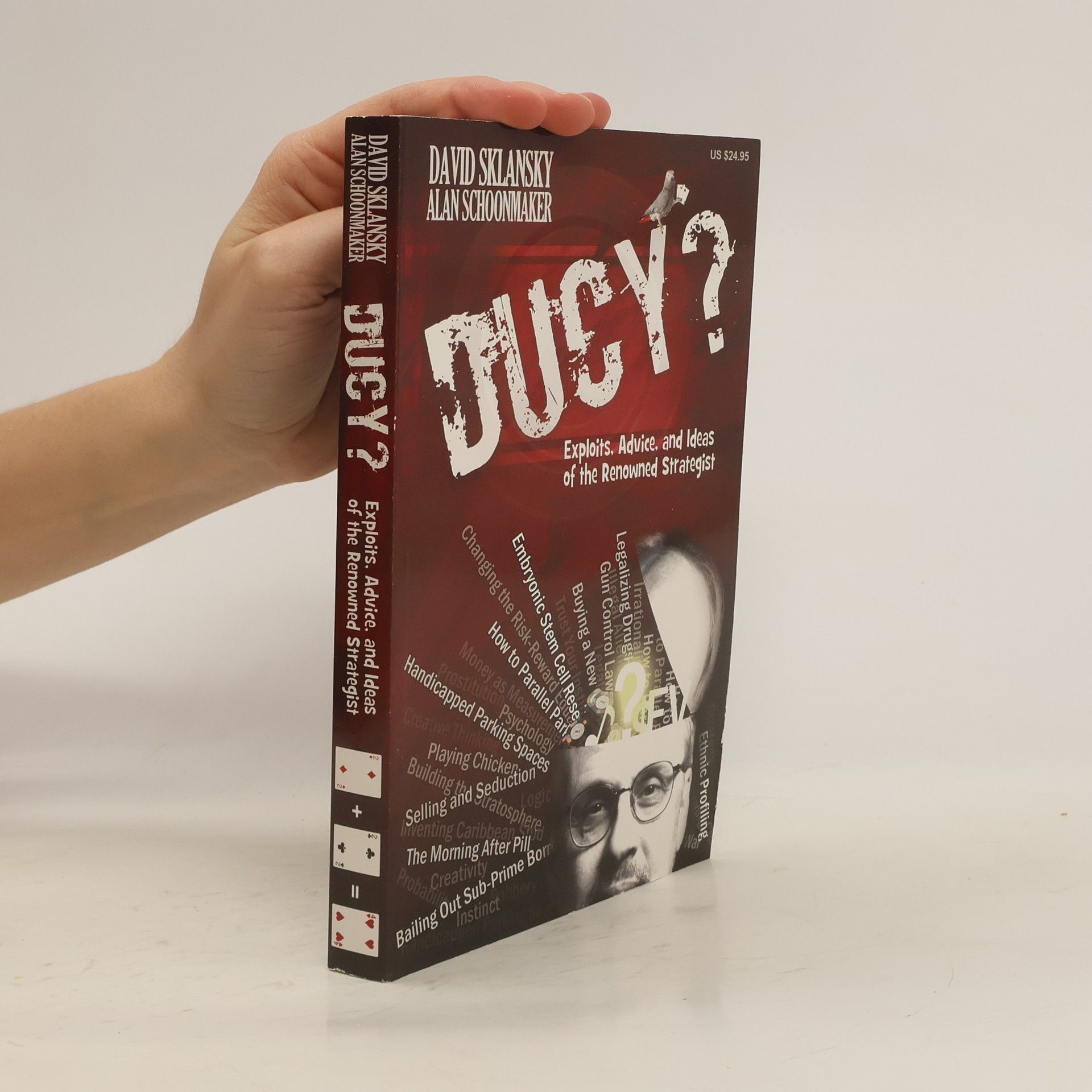This volume is a collection of recent articles written by David Sklansky that have appeared in various publications including Card Player, Poker World and the Two Plus Two Poker Strategy Magazine. A few have never before appeared in print. Most of the articles are about poker or gambling. However, David has recently branched out into other areas that lend themselves to his unique style of analysis and some of these essays are contained in this book. From the original book, Poker and gaming topics include Being a Favorite, Are Great Players Born? Talent Versus Discipline, The Importance of Position, Never Go Broke, When Time is Not of the Essence, and Is Your Wallet Fat Enough? Life topics include What It Is that Makes an Issue Controversial, Coincidences, Some Thoughts on Dying, Legitimate Grievances, and Crime and Punishment. This expanded addition also contains 32 additional essays, many of which address no-limit hold 'em. Essays for the Expanded Edition include Pros Versu
David Sklansky Books
David Sklansky is widely regarded as a leading authority on gambling, particularly poker and blackjack. He transitioned his early aptitude for strategy and mathematics, discovered during his time as an actuary, into the realm of games. Sklansky prefers the immediate financial rewards of demonstrable skill over abstract calculation, finding satisfaction when his superior knowledge directly impacts the outcome of a game. His writings on gambling are valued for their insightful analysis and strategic depth.






The Theory of Poker
- 301 pages
- 11 hours of reading
Discusses theories and concepts applicable to nearly every variation of the game, including five-card draw (high), seven-card stud, hold 'em, lowball draw, and razz (seven-card lowball stud). This book introduces you to the Fundamental Theorem of Poker, its implications, and how it should affect your play. Other chapters discuss the value of deception, bluffing, raising, the slow-play, the value of position, psychology, heads-up play, game theory, implied odds, the free card, and semibluffing. Many of today's top poker players will tell you that this is the book that really made a difference in their play. That is, these are the ideas that separate the experts from the typical players. Those who read and study this book will literally leave behind those who don't, and most serious players wear the covers off their copies. This is the best book ever written on poker.
No Limit Hold 'em
- 310 pages
- 11 hours of reading
No limit hold em is exploding in popularity. Before 2000, it could be difficult to find a game. In 2006, it is played everywhere in casino cardrooms, in bar backrooms and homes, and on the Internet. Now anyone can find a game, but few know how to play well. Most players learn by watching television or by listening to dubious advice from their friends. While they may have picked up a valuable tidbit here or there, most players come to the table without a winning plan. These players have two wise up or go broke. The world s foremost poker theorist, David Sklansky, and noted poker authority, Ed Miller, will wise you up quickly. No Limit Hold Theory and Practice is the definitive work on this complex game. It provides you a window into the heads of experts, teaching you in straightforward and enjoyable terms the how s and why s of winning play. It covers critical concepts like manipulating the pot size, adjusting correctly to stack sizes, winning the battle of mistakes, reading hands, and manipulating opponents into playing badly. It teaches you about implied odds and how to size your bets and raises effectively. It even covers many principles of short stacked play that will give you a big edge in no limit hold em tournaments. Never before have so many people played no limit hold em, and never before has there been so much opportunity to win big. If you want your share of the spoils, read this book!
Tournament Poker for Advanced Players
- 346 pages
- 13 hours of reading
Tournament poker is very different from standard ring game poker. While they might appear the same from a distance, there are many differences in proper strategy that are often unknown to many experienced cash game players. Some people excel at tournament poker. This is not luck. These are players who have an advanced understanding of what the proper strategy adjustments are, and when they come into play. It is no coincidence that the same competitors make it to final tables far more than their fair share. This book explains tournament strategies that only a small number of players have mastered. It assumes you already know how to play poker well, but aren't knowledgeable of tournament-specific concepts and when and where to use them. Some of the ideas discussed include: the effect of going broke, the Gap Concept, how chips change value, adjusting strategy to rising stakes, all-in strategy, final table play, making deals, the "System," focusing on weaker opponents, unusual plays with aces and kings, moving in against the blind, and much more. This newly-expanded version contains over 100 new pages of updated material dedicated almost entirely to today's most popular form of tournament poker: no-limit hold 'em.
Before the 1960s, the distinction between violent and nonviolent crime played hardly any role in the law. Since then, the number of crimes deemed violent has skyrocketed. David Alan Sklansky shows how shifting and inconsistent legal definitions of violence have fueled mass incarceration, protected abusive police, and undermined criminal justice.
Seven-Card Stud For Advanced Players
- 344 pages
- 13 hours of reading
Seven-card stud is an extremely complex game. Deciding on exactly the right strategy in any particular situation can be very difficult. Perhaps this is why very few authors have attempted to analyze this game even though it is widely played. In 1989, the first edition of this text appeared. Many ideas, which were only known to a small, select group of players, were now made available to anyone who was striving to become an expert, and a major gap in the poker literature was closed. It is now a new century, and the authors have again moved the state of the art forward by adding over 100 pages of new material, including an extensive section on "loose games." Anyone who studies this text, is well disciplined, and gets the proper experience should become a significant winner. Some of the other ideas discussed in this 21st century edition include the cards that are out, the number of players in the pot, ante stealing, playing big pairs, playing little and medium pairs, playing three-flushes, playing three-straights, randomizing your play, fourth street, pairing your door card on fourth street, proper play on fifth, sixth, and seventh streets, defending against a possible ante steal, playing against a paired door card, scare card strategy, and buying a free card.
A combination of Sklansky on Razz and Essays on Poker, with new material added, including a special section on tournament play. The essays section contains chapters discussing such concepts as having a plan, choosing your game, playing according to your bankroll, the three levels of expert poker, middle-round strategy, what your opponent reads you for, the protected pot, saving the last bet, extra outs, how to play a tournament, and many others. The razz section will show you how the experts play this form of poker. Not only are the rules and structure of the game discussed, but advice is also given on how to play the first three cards, as well as all the other streets. In addition, a chapter of razz problems is provided, plus questions and answers to help keep your game sharp.
Texas Hold 'em is not an easy game to play well. To become an expert you must balance many concepts, some of which occasionally contradict each other. In 1988, the first edition appeared. Many ideas, which were only known to a small, select group of players, were made available to anyone who was striving to become an expert, and the hold 'em explosion had begun. It is now a new century, and the authors have again moved the state of the art forward by adding over 100 pages of new material, including extensive sections on "loose games," and "short-handed games." Anyone who studies this text, is well disciplined, and gets the proper experience should become a significant winner. Some of the other ideas discussed include play on the first two cards, semibluffing, the free card, inducing bluffs, staying with a draw, playing when a pair flops, playing trash hands, desperation bets, playing in wild games, reading hands, and psychology.
When Jim McManus, author of the New York Times best-seller, Positively Fifth Street, read our manuscript, he wrote, Whenever I read something by David, I never fail to learn new things about the world. The book is fantastically illuminating, well written, works as a kind of autobiography, and Al's input is effective as commentary. You will probably feel the same way by seeing how creatively combining math, logic, psychology, and probability theory can solve problems you might have previously regarded as unsolvable. Your ability to identify and even manipulate other people's thoughts and desires should improve, as well as your ability to understand and resist other experts who attempt to do the same thing. And this book will almost certainly put money in your pocket. The title, DUCY?, was taken from our forums at twoplustwo.com. To encourage people to think better, David would often ask, Do you see why? before fully explaining his conclusions or advice. Forum participants created the acronym and started using it themselves, and it became so popular that the following definition now appears in the Urban Abbreviated form of Do you see why? Commonly used on online forums; originated from the Two Plus Two Poker Community. We believe that the term does a good job of capturing the essence of this book.



